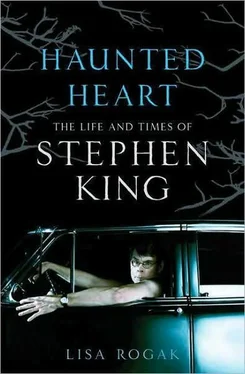Steve was more a wallflower than a Fred Astaire, but the common practice at the school was to cruise the girls, not gravitate to the dance floor. The guys would stand on one side of the gym and the girls on the other—though some girls would always be out dancing—and they’d walk around the perimeter of the dance floor, flirting and laughing at whomever they wanted to impress.
According to Pete Higgins, Steve was far from being a ladies’ man, and he was much more interested in going to some of the unofficial parties. A few classmates organized the after-hours parties at a cluster of abandoned houses a few miles from where Steve lived, and one of the houses was supposedly haunted; the last family to occupy the house went by the name of Marston.
After the students grew bored with the music and tired of being hounded by chaperones at the high school dance, they’d get three or four carloads of their classmates together and head over to the Marston house to scare the girls, drink, and make out. The drinking age in Maine at the time was eighteen, so it wasn’t too difficult to buy beer and whiskey, especially with a hulking six-foot-three-inch student in your midst. Someone would suggest a drive to a liquor store in Lewiston, thirteen miles away, and if the clerk refused to sell booze to Steve, they’d hover outside the door until they found someone to buy it for them, in the time-tested ways of teenagers everywhere. Or else, some kids would bring booze along from their parents’ stock.
On February 5, 1965, Steve saw his second dead body in just over a year when his grandfather Guy Pillsbury died. The death of her father meant Ruth was free from the grueling manual labor and subsistence living the family had been dealing with for almost seven years. Or so she thought. The family continued to live in the house, and she sought work in the area.
But as before, all she could find was menial, mind-numbing manual labor. Though she was no longer tied down to the house and her parents and was now earning cash instead of canned goods and hand-me-down clothes, the family was no better off than before.
Though it had been more than a decade since her husband had walked out on the family, Ruth never gave up trying to track him down, at least in order to receive some child support or an official divorce. But she never found him.
With her hard schedule and being away from home now, Ruth had no patience for pretense, especially when it came from her own sons. One day, she passed by Steve’s room and saw him preening in front of the mirror, playing with the lapel of his shirt and pushing up the cuffs of his sleeves, and something struck a nerve inside his mother. She rushed into his room, pushed him against the wall, and said, “Inside our clothes, we all stand naked. Don’t ever forget it.”
He was just trying to figure out how he could dress for the upcoming senior-class trip so that he wouldn’t stand out as much in the big city, but her words stuck in his head. However, as it turned out, he didn’t have to worry about standing out. The whole class did.
Two busloads of seniors from Lisbon High and a number of chaperones headed south for a weeklong trip to see the sights of New York City, Washington, D.C., and York, Pennsylvania, in April of 1966. The first stop was in New York for a couple of nights before heading to York. The class would spend a night each in Pennsylvania and Washington, then return to New York for two days before heading back to Maine. They stayed in hotel rooms, visited all the usual tourist attractions such as the Empire State Building in Manhattan, the Washington Monument and the Smithsonian in D.C., and Gettysburg in Pennsylvania.
What’s the one thing that high school seniors are going to do when they’re away from home in the big city—many for the first time—and easily able to dodge the chaperones? Find alcohol. Steve and his friends were no exception. The drinking age in New York was eighteen, the same as it was in Maine, and since Steve and some of the other students were already of age, they had no problem buying beer and liquor. But in York, Pennsylvania, where the drinking age was twenty-one, things got tougher.
“Steve was big and he looked older than the rest of us, so the choice was unanimous,” said Lew Purinton. “We sent him into the liquor store to buy beer and liquor. I remember him coming out of the store and looking very proud.”
Back in New York on the return trip, the high school seniors were feeling full of themselves with their success on the road, but their luck soon changed. They went into a bar in Times Square, but the bartender recognized trouble in the large group of cocky, out-of-town teenage boys and refused to serve them. So they headed to a pizzeria, where Pete Higgins noticed a beer named Tiger’s Club, a Bavarian black beer. They ordered a pizza and a round of Tiger’s Club for the table.
“It was absolutely the worst, bitterest stuff I’ve ever had in my life,” said Higgins, who, with Steve, forced down a few swallows before giving up. Next, they headed for a steak house, and when the waiter asked for their drink orders, booze was the last thing on their minds.
“Chocolate milk,” said Steve.
The waiter, an African-American man, snorted. “Man, down here we don’t call it chocolate milk, we call it black or white milk.”
So Steve said, “I want a black milk.” The waiter asked the next boy what he wanted to drink and he replied, “A black soda.” Purinton thought that made sense. “He thought if they called chocolate milk ‘black milk,’ a Coke would be a ‘black soda,’ ” he said.
All of a sudden, the waiter got mad. “Are you trying to be funny? If you are, my gang’s waiting outside for you.”
The boys panicked and left the restaurant before their drinks arrived. Whether the waiter was serious or if he was pulling their legs, Purinton didn’t know, but the table of self-described hicks from Maine got a quick lesson in life in the big city.
The students arrived back home a few days later and had another week before they had to return to school, after the weeklong April vacation.
Steve’d done well enough in high school to be offered a partial scholarship to Drew University, a Methodist college in Madison, New Jersey. But his mother couldn’t afford to send him, so in 1966 he applied to the University of Maine at Orono.
Though he was awarded a full scholarship to the University of Maine, Steve couldn’t afford to laze around for the week off. He still needed money for textbooks and other expenses, so he started his summer job two months early at the Worumbo Mills and Weaving in Lisbon Falls. He mostly worked in the bagging area, where other workers would blow fabric up into huge bins on that floor above, and it was Steve’s job to stuff the fabric into bags. When school started up again, he would maintain a breakneck schedule until he graduated, attending classes during the day and working at the mill full-time.
Somehow, he still found time to write a one-act play for the annual Senior Night in May. Past classes had performed skits, played musical instruments, and presented awards such as Class Clown and the like to individual students.
Luckily for Steve, the faculty members who said it was okay for him to write a one-act play for Senior Night had short memories, because Steve’s play turned out to be little more than a G-rated version of The Village Vomit, where he returned to poking fun at teachers and students with his thinly disguised parodies.
The play was called Fat Man and Ribbon, a takeoff on the popular Batman TV series, which first went on the air in January 1966. “Steve played Fat Man and the play was set at Lisbon High,” said Peter Higgins. “Fat Man and Ribbon were at Lisbon High trying to catch a disruptive student named Lew Corruptington, who wore a black leather jacket and was clutching a beer bottle.” Higgins played his own father, the principal. His name in the play was Principal Wiggins and he came out wearing a fright wig.
Читать дальше












